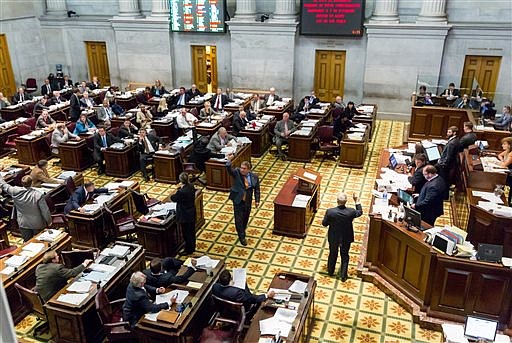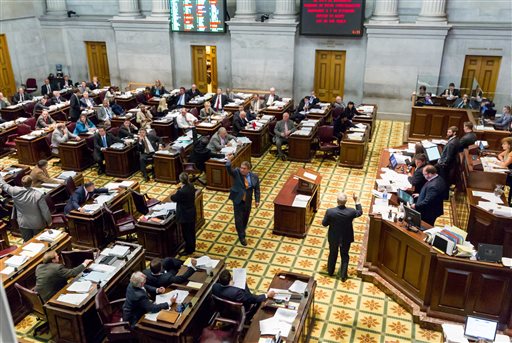Read more
Haslam plan little known, polls shows
And all for a job that isn't considered full time.
If you're thinking this is Republican Gov. Bill Haslam's Insure Tennessee proposal -- his plan to use federal Medicaid dollars to extend health coverage to 280,000 low-income Tennesseans including the working poor -- guess again.
This is the Tennessee government's existing group insurance program for full-time state employees.
BY THE NUMBERS
88: Number of state House on state employee insurance plan 23: Senate members on the plan 88 percent: Share of 132-member General Assembly on the plan 80 percent: Employer share of premium 20 percent: Employee share $114.49 to $387.67: Monthly premiums, depending on circumstances $450 to $3,850: Deductibles, depending on circumstances $2,300 to $9,500: Annual out-of-pocket maximum, depending on circumstances Source: Office of Legislative Administration.
Haslam's proposal is expected to face rough sledding among many of the 73 Republican House members and 28 GOP senators because it's funded through President Barack Obama's Affordable Care Act, which Republicans call Obamacare.
GOP lawmakers fear that the tiniest hint of support for Obamacare could lead to them being attacked in their next primary election -- one has described Obamacare as "Kryptonite." But a number also have philosophical and other concerns, including not trusting the federal government.
Rep. JoAnne Favors, D-Chattanooga, said lawmakers' own insurance coverage is something Haslam's GOP critics ought to think about.
Most, if not all have some type of insurance protection, while thousands of their constituents don't, Favors said.
"I think it's selfish of any of us who are able to access the state insurance system and don't feel that others should share in coverage, too," said Favors, a retired nurse and health care administrator.
Tennessee lawmakers aren't considered either full time or part time, according to the National Conference of State Legislatures, which says they fall into a "hybrid" category. Efforts to learn which lawmakers are on the state employee insurance program were unsuccessful.
Connie Ridley, the General Assembly's director of administration, said disclosure is forbidden under privacy provisions in the federal Health Insurance Portability and Accountability Act (HIPAA).
Favors volunteered that she has the coverage.
So did House Republican Caucus Chairman Glen Casada of Franklin, who opposes Haslam's proposal. Casada acknowledged lawmakers' insurance is not a bad deal. He noted that he is required to make co-payments and has a $1,000 deductible.
His opposition to Haslam's plan is over who's the boss.
"We just want to be in control and I contend we're not in control," Casada said. Instead, the federal government is, Casada said -- and the feds can't be trusted.
Haslam's two-part proposal includes vouchers for workers to join their employers' health plans. The other part operates more like a traditional Medicaid program but with incentives for healthy behaviors and modest co-pays for prescriptions.
Enrollees earning up to 138 percent of the federal poverty level -- about $16,000 a year -- would face co-pays of $75 per in-patient hospital admission. Going to the emergency room for non-emergency purposes carries an $8 co-pay.
"That's all we're asking, is that the feds let the governor's plan be that way and don't override us when we require $8 co-pays and what not," Casada said. "They have not in the past. So it's not a matter of is the plan good. It's a good plan. I think many of us say we're either in charge or there's no deal."
Haslam says he has verbal and written commitments from the Obama administration that the state can jettison Insure Tennessee at any time if funding or other issues pose problems.
After hearing Haslam pitch his Insure Tennessee proposal in Murfreesboro last week, Rep. Sheila Butt, R-Columbia, told reporters that "we have to look not just at the impact at this moment, but the impact two years from now."
In an interview afterwards, Butt said she and her husband had gotten state coverage under a less-expensive option that encouraged healthy behavior and saved them $60 or $70 a month. She said her experience there makes her doubt whether Insure Tennessee beneficiaries will put up with it.
"We were getting emails constantly -- have you had your blood pressure checked, have you been to the doctor," Butt said. "We would even get emails about our psychological assessment. How many 'blue days' have you had this month."
Butt, who noted she considers herself a "very frugal person," said that after a year, she and her husband decided it wasn't worth the hassle.
"If I feel this way, I wonder if 300,000 [will] who take the Healthy Incentives plan," Butt said. "So I do question that."
Asked if she still has state insurance, Butt said yes, but under a different plan.
"We don't have the [health] partnership because there were too many hoops to jump through. ... I can't see how many of those people are going to do that."
Contact staff writer Andy Sher at asher@timesfreepress.com or 615-255-0550.

